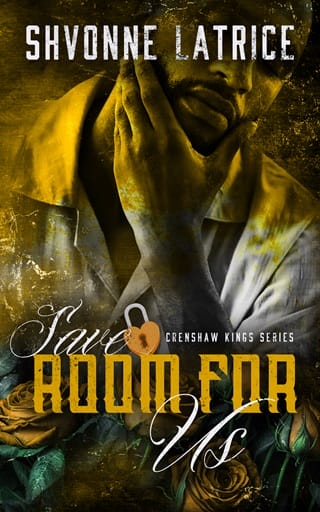Chapter 4
CHAPTER 4
“Maddy, why don’t you take that sweatshirt off?” asks her mother, more strong suggestion than question.
“It’s cold in here.”
While it is chilly enough in the Pine Meadows Clubhouse to keep raw meat from rotting, Maddy has her gray NYU hoodie on and zipped up to her neck to hide the “nice” dress her mother forced her to wear. It’s essentially the same hideous dress her mother, Emily, and most of the women in this dining room are wearing—resort-style, every inch of fabric crammed with floral patterns in raspberry pink, turquoise blue, and all the other favorite Crayola crayon colors of a three-year-old girl. If a unicorn and a princess had a baby and that baby puked all over a dress, that is the garment Maddy is wearing under her hoodie.
She sips her ice water and takes a visual tour around the room as she, her mother, and Emily wait with napkins in their laps for Jack and Phil. The dark wood bar, windows overlooking a putting green, white linen–covered tables, gold-framed oil paintings of the golf course, the Connecticut countryside, and horses. The waitstaff are a collection of working mothers and college students, grandchildren of club members. The diners are a sea of homogeny—white, old, and monied.
Most are retirement age, older than her mother by at least a decade. The women’s faces are Botoxed and filled, stretched smooth and taut, perched atop necks that are loose and crepey, the mismatch both absurd and unsettling. They wear excessive makeup and big jewelry, and for what Maddy imagines they collectively paid for the designer bags they all carry, they could’ve solved food insecurity for the entire state of Connecticut. But hungry people don’t exist here at Pine Meadows. And it’s important to tote the keys to your Mercedes in a Birkin.
Jack and Phil enter the room, hair still wet from locker room showers, both wearing collared shirts, blue blazers, and khaki pants. They stroll over to the table, no hint of hurry in their steps, and sit down.
“How was golf?” asks her mother.
“Not my best round, but Jack here crushed it.”
Jack smiles in immodest agreement. “I had two eagles. Today was epic.”
If a game has a stick or a ball, Jack is good at it. One year older than Maddy and a rising junior at Boston College, he is immature and lazy and has the emotional intelligence of the oysters he’ll probably order, but he was born with the best form of currency for an American boy—white, good-looking, and naturally athletic. Life is a Disney show for Jack, and he is its adorable, mussy-haired lead.
Their waitress hands them each a menu. “Can I start you with anything to drink?”
“I’ll have a dirty martini, please,” says her mother. “Grey Goose.”
Jack orders a Coke and the sisters stick with water.
“I’ll take a cabernet,” says Phil.
Phil is her mother’s second husband. Her mother’s first husband, Stephen, Maddy’s father, left when Maddy was four. None of them know where he went then or where he is now, whether he’s dead or alive. They searched for him three years ago when his mother died but found no trace of him. Google pulled up pages of Stephen Banks, but none of them were her father. He’s not anywhere on social media.
She doesn’t remember or know much about him. From grown-up conversations not meant for her ears, she learned when she was young that he was a drinker and a gambler, that he’d cheated on and been violent with her mother. But her mother never speaks of him now. No one does. There are no photographs of him in their house, and Maddy can’t really picture what he looks like anymore beyond the vague sense that he was handsome.
She remembers the boats he collected. Sailboats, a motorboat, a catamaran, a canoe, washed ashore in various states of disrepair on their front lawn. It only occurs to her now how crazy this nautical junkyard must’ve looked to the neighbors and anyone driving by, how embarrassed her mother must’ve felt. But it all seemed normal to Maddy at the time. Boats in the front yard were no different to a four-year-old than a swing set, patio furniture, and a grill in the back. She remembers playing pirates on them with Jack.
The boats disappeared shortly after her dad did. Maybe he’s on one of them right now, sailing between tropical islands somewhere in the South Pacific, pointed wherever the wind blows him. Or maybe he’s changed his name and moved to Mexico and is littering another family’s front lawn with a new fleet. Or maybe he’s dead.
“The Rogens are here,” says Emily. “I’m going to go say hi. Mom, order for me, okay?”
Emily stands, sophisticated and mature in her nice dress, a “mini me” of their mother. She’s five foot four, merely two inches taller than Maddy, but always in heels, she towers over her younger sister. Maddy looks down at her feet in flip-flops. Emily is a woman. Maddy is still a girl.
Granted, Emily is five years older than Maddy. But even when they were little, Emily felt more like another mother than a sibling. They shared a school for only one year, when Maddy was in kindergarten, Jack in first grade, and Emily in fifth. All three Banks kids rode the bus together that year, but Maddy always sat in the front with Jack, and Emily walked past them, choosing to sit in the back with her friends. Maddy would let Jack have the window seat so she could turn her head and watch her sister trading friendship bracelets, listening to music, and giggling. Maddy wanted to be just like her when she grew up.
That didn’t happen.
Emily walks to the other side of the dining room where she greets Susan and Ken Rogen, their parents, and their two kids whom she babysits, both in high chairs. Ken gives up his chair for Emily and drags another one over from a neighboring table for himself. The older child, a boy, almost four and a little too big for the high chair, legs dangling, keeps dropping french fries on the floor. Emily picks them up. She gestures as she says something, and the little boy throws his ketchup-covered face to the ceiling and laughs.
Emily’s a model citizen of whatever world she inhabits, quick to understand her part and all its unspoken rules. Everyone loves Emily. She graduated from Vanderbilt two years ago with a degree in childhood education and immediately got a job as a first-grade teacher in a private elementary school in Manhattan. She lives in Murray Hill with her fiancé, Tim. They’re getting married here next June.
She comes home on the weekends, when she can, to visit and to make some extra cash by babysitting for the Rogens. She wants to be a wife and mother and live in a four-bedroom colonial with a white picket fence and a cute dog, a doodle so it doesn’t shed on her pretty sofas and expensive rugs. Her life dream is basically a replica of their mother’s life, minus the divorce. Maddy tries to imagine wanting the same things, the life that’s expected of her by way of example and a million direct and indirect messages, but something inside her cringes, repulsed, allergic even.
“Do we know what we want?” asks their waitress as she places her mother’s martini on the table.
“I’ll have the little gem salad and the salmon, and my daughter,” her mother says, pointing to the empty seat next to her, “will have the same.”
“I’ll have the foie gras and the filet mignon,” says Phil.
“The usual for you?” asks the waitress, smiling at Jack.
“Yeah,” says Jack, pleased to have his needs anticipated. “A dozen oysters and the Wagyu beef sliders.”
Maddy orders the goat-cheese-and-arugula flatbread.
Her mother takes a generous sip of her martini, then sucks one of the green olives off the toothpick and chews it. Phil offers her the bread basket, a gesture they all know she’ll refuse. Her mother plays cardio tennis and rides the Peloton for an hour a day, counts her steps and calories, and weighs herself every morning, devoted to keeping her forty-five-year-old body looking not a day older than thirty-seven.
Phil chooses a roll from the bread basket and slathers it with an unapologetic hunk of butter. He will later order and devour a hot fudge sundae for dessert. This kind of eating with abandon combined with at least sixty hours a week of sitting in his car, the train, and his office have resulted in a less-than-hot bod for Phil. He’s got a potbelly, a double chin, and old-man boobs. If he were a woman, he’d be wearing Spanx and a push-up bra, squeezed into a more acceptable shape, sipping constricted breaths beneath all that wire and Lycra, and he would’ve ordered a salad and passed on the bread. But he’s a sixty-five-year-old man, successful and married, and he’s doing exactly what he’s agreed to do. He brings home the bacon, and he’ll eat as much of it as he wants.
Her mother married Phil three years after Maddy’s father left. They met at this very country club. Desperate to keep up with her mortgage payments and not lose their house, in addition to working days at their local independent bookstore, her mother had been waitressing here at night while Maddy’s grandmother watched her, Emily, and Jack.
While she’s sure her mother was stressed and exhausted, Maddy remembers those days fondly. Her mother often brought a book home from the bookstore for Maddy, sometimes two a week. She read every installment in the Magic Tree House series. Jack and Emily weren’t especially into reading, so they didn’t get anything. Only Maddy. Each book felt like a gift, a special holiday celebrating Maddy.
She remembers reading by flashlight way past her bedtime, struggling to stay awake until her mother got home from waitressing at the club, hoping to have the chance to say good night when her mother would crack the door open to check on her. Some nights, her mother would crawl into bed with her for a few minutes. She’d listen to Maddy recount the plot of whatever story she was in the middle of, even though it was so late and she was likely bone-tired. Sometimes Maddy could even convince her to read the next chapter aloud.
Sunday nights before Phil were always waffle night. They ate in their pajamas and were allowed to add whatever toppings they wanted. Her mother and Emily stuck with classic maple syrup and butter, but Maddy and Jack slathered their waffles thick with Nutella and squirted a pile of whipped cream on top of that if they had it. Sometimes Maddy added a scoop of vanilla ice cream, too. Those dinners obviously wouldn’t have won any awards for nutrition according to any food pyramid, but they were emotionally nourishing. Maddy remembers feeling nothing but relaxed and silly love gathered around the kitchen table on Sundays.
Her mother stopped working, both at the bookstore and at the club, when she married Phil, and they all moved into a gigantic new house, mortgage-free. Sunday night waffle night was swiftly replaced with dinner at the club, which required wearing clean, matching clothes instead of comfy pajamas, sitting politely with napkins in laps, and for a long while, ordering salads with their meals. Maddy hasn’t seen her mother’s waffle iron in a decade.
Phil works in banking or something having to do with money (Maddy has never been entirely clear about what he actually does for a living) and makes a lot of it. He leaves the house every weekday morning at five thirty, takes the train into New York, and is home every night at six forty-five. On weekends, he reads several newspapers, watches the news and golf, and whenever the weather is good, plays at the club. He doesn’t drink more than two beers or a glass of red wine and only on the weekends.
As a stepfather, he’s like that abstract painting at the top of their stairs, a fancy big deal when he first arrived in their lives, but after a while, he became easy to ignore. He loves Maddy, Emily, and Jack, but it’s an arms-length, neatly-worded-holiday-card kind of sentiment. He’s already raised his daughter and made it clear from day one that he wasn’t up for doing it again. He’s always left all the parenting up to her mother, which has probably left her feeling lonely at times, but it also has given her total authority and, as a byproduct, little for them to argue about.
Overall, Phil is responsible and dependable, never raises his voice, and thinks her mother is the most wonderful woman in the world. And so far, he hasn’t put anything embarrassing on their front lawn. Her mother couldn’t be happier.
But Maddy doesn’t get it. Phil is an old man. He looks like the grandfather in this family picture. There’s no passion between him and her mother, not that Maddy has any desire to see them making out or, God forbid, having sex. She shivers. Gross. But her mother is only in her midforties, a young woman relatively speaking, vibrant and beautiful. The skin on her face still matches the skin on her neck.
And Phil is boring. The reason why Maddy can’t articulate what he does for a living is because any time he starts talking about business with Mr. Bladeeblah, her brain checks out within milliseconds, diving deep and with gratitude into the nearest topic it bumps into—climate change, tiny houses, Beyoncé, Brazil.
Don’t get her wrong. He’s a nice enough guy. He gives them all the life her mother wants. They live in a big house and can afford vacations and college without student loans. Her mother is always marveling at how lucky they are to live like this, to have all that they have. But it seems to Maddy that her mother traded an awful lot for a stable life.
“So how’s the job at Starbucks going?” asks Phil.
“It’s going,” says Maddy.
“Help you appreciate your college education,” her mother says. “Jack, no phones at the table.”
“Okay,” says Jack.
But Jack doesn’t put his phone down, and no one says anything. Jack always does whatever he wants. A man and woman following a waitress to their seats spot her mother and Phil and change course, faces lit up.
“Amy, Phil! So good to see you,” says the woman.
“Hi, Barbara. Hi, George. It’s good to see you, too,” says her mother, her face instantly wardrobe-changed to match Barbara’s. “How are you?”
“We can’t complain,” says George.
The four of them laugh at this hilarious response.
“Your kids are getting so big,” says Barbara.
Maddy stopped growing when she was fifteen.
“Maddy just finished her first year at NYU,” says her mother.
“Oh, that’s wonderful. How do you like it?”
“It’s good.”
Because what other answer is there? It’s not a real question. They’re not having a real conversation. This is the script, and they have to stick to their lines.
“What are you majoring in?” asks Barbara.
“Uh, I don’t know yet.”
“Well, I’m sure you’ll figure it out, dear.”
Well, as long as Barbara is sure. Maddy digs her fingernails into the skin on her wrist. She doesn’t know what she wants to major in, what kind of career she wants, where she’ll live after college. She has three more years to figure out her entire life, and she has no direction, no calling, no clue.
She much preferred high school, where classes were required and essentially chosen for her, where everyone went to the football games on Saturday, Adam was her boyfriend, and she was happy. Her only pressure was getting into college, a directive that never felt oppressive to her, because of course she’d get in somewhere. She applied to thirteen colleges, a list curated by her guidance counselor, and was accepted into two—UConn and NYU. Adam got into Columbia, early acceptance, so he’d be in New York, and Emily lived there, too. So the decision to go to NYU was a no-brainer. But ever since her first day, she can’t help but feel she’s in the wrong place.
“And Jack will be spending second semester this year in Australia,” her mother says proudly.
“How exciting,” says Barbara.
As Jack enthusiastically shares the details with Barbara and George about his upcoming winter semester abroad, an itinerary Maddy knows by heart because it’s all he talks about, she tunes out and looks around the room at the couples and families eating their dinners. They seem happy enough. But are they? Is this what she’s supposed to want and strive for? Dressing in matching costumes, chitchatting about nothing, married with children, perpetuating this mind-numbingly meaningless nightmare, this endless loop of absurdity? These people are all breathing miracles of DNA in bodies that took 13.8 billion years and an impossibly unique and unbroken chain of events to be here, and this is how they choose to spend the days and nights of their precious existence before being snuffed out forever? It all feels so pointless to her.
Their waitress arrives and sets Maddy’s dinner in front of her. She pokes at the white lumps of goat cheese with her fork, her stomach unsettled, not hungry. Maybe she’s an unappreciative, spoiled brat. Maybe her life has been too sheltered, too easy, too privileged.
Oh, I’m sorry, dear, are the designer clothes, air-conditioned dining room, clean drinking water, and artisanal flatbread not to your liking? What else can I get for you?
Not this.
 Fullepub
Fullepub 


